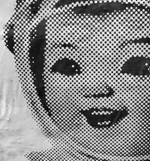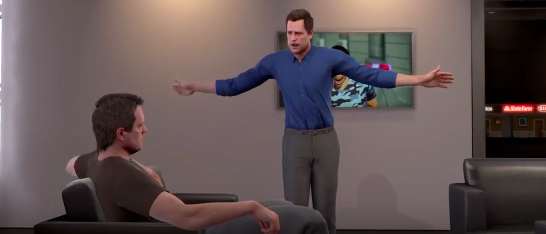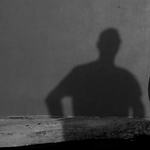Everyone has one of those formative moments in life, when they suddenly come to the realization that, in that moment, of all the infinitesimal moments in the entropy of the universe, they will begin to become the person they ultimately choose to become.
For some, that moment of enlightenment comes from a conversation with a parent or a teacher. For some, it comes from a job fair or an interview.
Mine came from a song.
It was nearing the end of the period for my 11th-grade English class. We were reading Revolutionary Road, studying ennui and mid-life crises, feelings of disillusionment in the midst of social pressures and normative values. And to hit the message home, our teacher played us a music video to a Radiohead song called “No Surprises.”
I’ll never forget that video. I’ll never forget seeing Thom Yorke’s head in a fish bowl, or whatever the hell that is, as it fills up with water and he is deprived of air. I’ll never forget how I felt when I watched it, when he sang to me of “a heart filled up like a landfill” and “a job that slowly kills you.” Every word, every note was perfect, almost as if this song was for me. I wasn’t living such a dark, depressing life. But I could feel that darkness. I could understand it. In a way, I could appreciate it. In an instant, I knew. I was a Radiohead fan.
In many ways, Radiohead has informed my worldview, and perhaps that isn’t always for the best. I look at circumstances through dark lenses. I see the less-than-ideal side of things that I’d much rather ignore. You know the old cliché: The more you know…
But I wouldn’t have it any other way. Yorke, Jonny Greenwood and the others — Yorke and Greenwood seem to be the only members we talk about, rather unfairly — are, unequivocally, the greatest musicians of our time. And if 2011’s King of Limbs, with its uncharacteristically boring, mostly forgettable tracks, brought that into question, 2016’s A Moon Shaped Pool reminds the Maroon 5-, Taylor Swift-loving world that there is a higher power in the world of music. Its name is Radiohead.
Radiohead is known for changing the game with every album, moving in a new stylistic direction. But this time, the band has done something unprecedented, electing instead to put together an album that in many ways plays like a throwback to the group’s older work. But it sidesteps the risk of staleness by giving Greenwood the reins, effectively turning this into a hybrid of classic Radiohead and classic Greenwood — whose soundtracks, namely There Will Be Blood, are excellent. His influence, especially in the pizzicato strings of the opener, “Burn the Witch,” is immediately evident.
But if “Burn the Witch,” perhaps a satire of xenophobia, is important in an age of Donald Trump’s demagoguery, the better song is “Daydreaming,” a haunting track that exposes us to Yorke’s new vision of the world. He’s never been an optimist, but after a painful divorce, things are looking darker than ever.
“It’s too late, the damage is done,” he sings. “This goes beyond me, beyond you.” The synthesizer backing here is something we haven’t heard from Radiohead, a strange yet euphonic bit of ‘80s cheesiness that works surprisingly well.
Radiohead sang of aliens on OK Computer, a topic the band returns to here: “And in your life, there comes the darkness. There’s a spacecraft blocking out the sky. And there’s nowhere to hide. You run to the back and you cover your ears. It’s the loudest sound you’ve ever heard. In your darkest hour.” In many ways, this feels like the sequel to that album, written as a warning to the ‘90s, from a not-too-distant dystopia.
Radiohead has always expressed a disillusionment with the world, but now, there’s something more palpable: Fear. The narrator of “No Surprises” and OK Computer has grown from a 20-something ‘90s punk into a 40-something yuppie trying to feel some vestige of contentment in this world. “Glass Eyes,” with its beautiful, warped piano and icy orchestral backing, is the track where everything makes sense.
“Hey it’s me, I just got off the train,” Yorke sings with that fragile desperation in his voice. “A frightening place. Their faces are concrete grey. And I’m wondering, should I turn around?”
This is the Radiohead that once warned us of technology, of the negative power and influence of the Internet, learning that its ‘90s rebellion was for naught, living in a cold world of gadgets. Yorke and his bandmates have taken a quiet life of impersonal text messaging and Facebook friends, a handshake of carbon monoxide. They’re scared, because they never wanted this. But we all knew it was inevitable that they’d get it.
There is, however, a shift here, when the group breaks free of the constraints of its pessimism, when Yorke locates the source of his despair and tries to rise above it: “Broken hearts,” the band tells us in one of the album’s catchier moments, “make it rain.”
Yorke understands that a true pessimist is lost. A true pessimist can do no good, can exert no influence on the world, can see no change. A true pessimist must merely give up and never fight. A true pessimist believes there’s no point. And that cannot be Radiohead. Radiohead fights.
And so the ‘90s punks return, in a way, with “The Numbers,” a climate change protest piece. It’s Yorke’s way of saying that there’s still hope. And where there’s hope, there’s protest.
“The future is inside us,” he sings. “It’s not somewhere else.”
In a rare moment of fan service, the album closes with “True Love Waits,” a long-time favorite of Radiohead concert-goers. But unlike the “shitty live version,” as Yorke has called it — what an exquisite piece of shit — this version is stripped down. It shouldn’t work, built as it is around a gentle trickle of discordant notes. Somehow this mess blends into a beautiful, minimalist melody. It will move you, as any great Radiohead song should, an indication that the band we once knew is back. It’s older, it’s wiser, it’s sadder. But it’s also more hopeful, and that’s significant, as we grow to realize that we are living in the world that Radiohead had foreseen.
“Have you had enough of me?” Yorke asks in “Decks Dark.” The answer, in a world of no alarms and no surprises, is that we haven’t.



